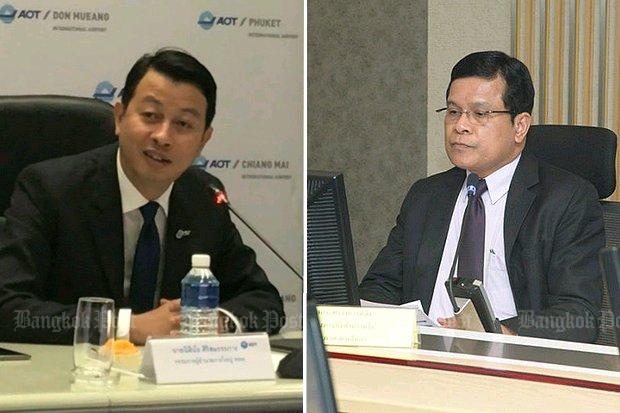Thai gov’t don’t want to give a concession on duty-free to one enterprise

Airports of Thailand president Nitinai Sirismatthakarn (left) faces Prapas Kong-ied, director-general of the State Enterprise Policy Office in a showdown over duty-free at the country's biggest airports
BANGKOK, Mar 19, 2019, Bangkok Post. The State Enterprise Policy Office (Sepo) has said the Public-Private Partnership (PPP) committee, instead of Airports of Thailand (AoT), must have the final say on whether the concession for duty-free operations at four major airports comes under the PPP law, reported the Bangkok Post.
The move came after the AoT threw down the gauntlet on Monday, claiming that the controversial concession does not fall under the the newly amended PPP law.
Sepo director-general Prapas Kong-ied said the PPP committee has yet to decide on whether it would form a legal panel to deal with the matter.
“Deputy Prime Minister Somkid Jatusripitak has ordered Sepo to first clarify the way the scheme should be handled before they proceed,” said Mr Prapas.
The AoT, which earlier planned to open the bidding process for the duty-free concession at Suvarnabhumi, Chiang Mai, Phuket and Hat Yai airports today, decided to put off following the Transport Ministry’s order on Friday.
The ministry’s order came when Prime Minister Prayut Chan-o-cha raised concerns over a possible monopoly, after the AoT announced it would merge the concessions of the four airports into one and decided to go ahead with the bidding process without waiting for the decision of the PPP committee.
The new PPP law, which came into effect on March 10, requires the chairmen of the Thai Chamber of Commerce, the Federation of Thai Industries and the Thai Bankers’ Association to be included as members of the PPP committee. It also requires the regulations and mechanisms relating to the bidding process to be made more concise, transparent and inclusive.
The Anti-Corruption Organisation of Thailand (ACT), an national anti-graft network, demanded the concession, which is valued at more than 100 billion baht, should be scrutinised under the PPP law for the sake of transparency.
ACT secretary-general Mana Nimitmongkol stressed that the merging of the four concessions into one could set a precedent for further monopolistic practices.
Mr Mana said that airports abroad, including those in Japan, China, South Korea, and Singapore, separate duty-free concessions depending on the type of products, which allows different operators to apply best practices that apply to their operations.
“I wonder if there is a need to grant a concession to a single entity in Thailand,” said Mr Mana.
AoT president Nitinai Sirismatthakarn insisted the master concession of the scheme is not in line with the PPP law.
Although Section 7 of the act stipulates that the joint investment concerns aviation businesses and other related businesses, AoT believes the development of commercial zones and duty-free operations at the airports are not associated with aviation operations, he said.
“As such, airports would still be able to operate in the absence of duty-free operations,” said Mr Nitinai.
He also stressed the merging of duty-free operations at the four airports into a single concession would not be regarded as a monopoly.
said duty-free pickup counters at the four airports would be liberalised, which means duty-free operators could run duty-free malls outside of the airports in key tourism spots across the country.
This would help boost business for duty-free shops in Bangkok, Mr Nitinai said, before referring to the experience of Phuket, where more than 10 duty-free shops were opened after the airport liberalised the market. “There is definitely no monopoly there,” he said.